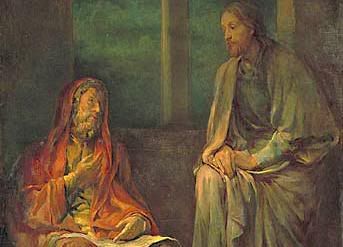But did he believe?

So often when a person is told about the kingdom of God, they have empirical questions. "Where is the evidence of the flood?", "How do we know Jesus even existed historically?", "How old is the earth?".
And so Christians think, "If we can show these people the signs of heaven, then they'll want heaven to be in them. It will happen so naturally we will hardly need to tell them about it."
And this gives birth to two activities: natural theology and apologetics.
Perhaps one of the best apologists ever was that Jewish leader Nicodemus.
Nicodemus came to see Jesus at night. Perhaps we may suspect his timing as a lack of confidence, but Nicodemus explains things differently:
"Rabbi, we know that You have come from God as a teacher; for no one can do these signs that You do unless God is with him."
Nicodemus explains his "assuredness" to visit Jesus at night:
"Seeing is believing" + "I saw Jesus perform supernatural actions" = "Jesus is supernatural"
What could be simpler than that? But Jesus appears to explain things differently:
"Truly, truly, I say to you, unless one is born again he cannot see the kingdom of God."
There are a couple unusual things about Christ's statement. The first is this state where one is "born again". Jesus singlehandedly takes a word "born" with a commonly understood meaning and makes it mean something totally different.
The second unusual aspect of Christ's words is the way he claims "seeing" the kingdom of God is a matter of who you are.
Most everything in the physical world is empirically verifiable. For example, the existence of the statue of liberty is empirically verifiable. As long as you can see the statue of liberty you can be sure it exists.
It doesn't matter what kind of person you are, when you look across the New York harbor you can see the statue of liberty. Some people find truth more profound the more everyone can see it.
It is different in the world of the spirit. These physical factors contribute to other physical factors, but, "The spirit gives birth to the spirit."
Jesus tells Nicodemus he should not be surprised - he must be born again.
Nicodemus thought he had totally "figured out" who Jesus is. He had thought it through, and he had an interesting argument to assert who Jesus is.
He had an argument. The believability of the argument rested on the signs and on seeing.
In Jesus' world however, believing is seeing.
Labels: Bible Reflection


2 Comments:
Good stuff! Very edifying for me :)
I like how your exposition of this passage focuses on the act of 'becoming'... that word seems to be becoming near-central to my personal philosophy/theology.
Thanks for finding my blog, and in turn, allowing me to read yours... I hope to visit again soon...
(I'm also spending a little time on a second blog: diaspora.voxtropolis. c o m )
Thanks for visiting. I'm glad you were edified.
An excellent source on what it means for the existing individual to come into being "again for the first time" is the Philosophical Fragments by Climacus.
I'll be sure and check out your site!
Post a Comment
<< Home